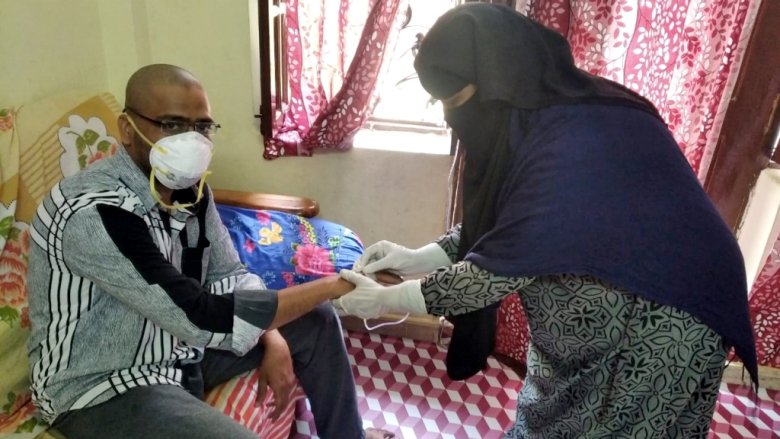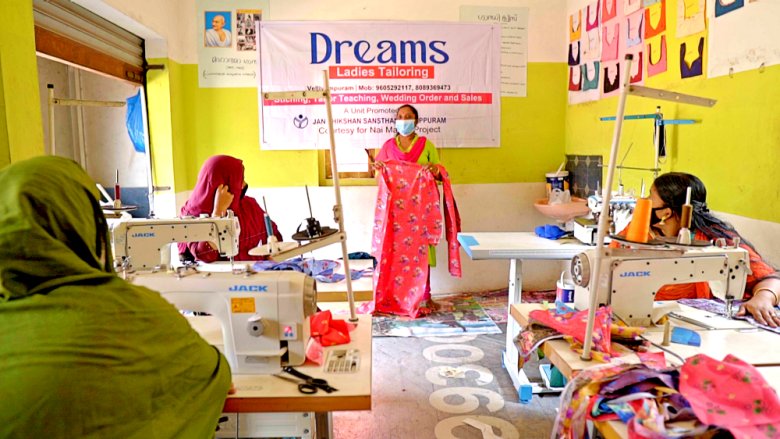Challenge
Despite India’s economic growth since the turn of the century, many young people from religious minority communities have lagged behind in economic gains and access to opportunities. These groups—Buddhists, Christians, Jains, Muslims, Sikhs, and Zoroastrians—make up almost 18 percent of India’s population, or about 225 million people. They tend to have much lower levels of education and employment than the national average. In 2015, with support from the World Bank, the government of India launched the Nai Manzil scheme to give a second chance to young people who had been unable to finish their school education and to offer them the opportunity to learn new work skills.
Approach
The Nai Manzil scheme sought to address the needs of young people between the ages of 17 and 35 belonging to minority communities who had been unable to finish their formal schooling, and to help them acquire the skills needed to enter the workforce or obtain a better job. The project enabled beneficiaries to re-enrol in school so that they could complete Grade 8 (the minimum level required by most training programs or entry-level jobs) or Grade 10 (needed to enter training programs in higher order skills, leading to better job opportunities). Beneficiaries were trained as tailors, health care providers, electricians, data entry operators, automotive services technicians, and plumbers, among others. Project Implementing Agencies (PIA) were contracted to provide non-residential, integrated education and skills training for 9 to 12 months, with a minimum of three months devoted to training that complied with India’s National Skills Qualifications Framework. The agencies also provided the beneficiaries with coaching, counseling, and networking support to help them obtain sustainable employment.
Results
The Nai Manzil scheme contributed to building India’s human capital by addressing the limited availability of good quality, market-relevant skills training for underserved minority youth, with specific targets for girls. The project expanded the involvement of the private sector by selecting PIAs through competitive contracting processes. By placing heavy focus on data collection, monitoring, and evaluation, the project also improved the capacity of India’s education and skills development programs to finance, deliver, and evaluate results.
Between 2016 and 2021, the major results achieved included:
- 98,697 minority youth across 26 states and 3 Union Territories enrolled in the scheme; 49,813 (50.47 percent) of these were women.
- 49,082 received an education certificate (Grade 8 or 10); 25,556 (52.07 percent) of them were women.
- 93,485 minority youth, of whom 47,497 (50.81 percent) were female, received a skills certificate for a high-demand trade or service sector such as healthcare worker, assistant electrician, and solar technician.
- Despite the difficult conditions created by COVID-19, 44,002 youth (21,899 of them women) obtained employment directly after leaving the Nai Manzil scheme, including some who started their own businesses.
- 8,546 youth enrolled in further education or skills training; 5,272 (61.69 percent) of these were women.
- 94 percent of Nai Manzil youth surveyed noted broader positive impacts, including an increase in self-confidence and self-worth (62 percent of beneficiaries); an increase in income, which helped their families manage household expenses (37 percent); and an improvement in their families’ standard of living (37 percent).
Bank Group Contribution
The Nai Manzil project was approved in October 2015 and became effective in February 2016. It was funded with an International Development Association (IDA) credit of $50 million and a matching contribution from the government of India. The project also received a $200,000 grant from the Results in Education for All Children (REACH) Trust Fund to carry out analytical work on the use of incentives in short-term education and skills training programs.
Partners
India’s Ministry of Minority Affairs (MoMA) was the overall implementing agency for the scheme. The education and skills training activities were implemented by competitively selected PIAs that entered into results-oriented performance agreements with MoMA. The PIAs were a mix of for-profit and non-profit entities. MoMA also worked closely with the National Institute for Open Schooling and its state-level equivalents, as well as with Sector Skills Councils. MoMA and the World Bank also provided support through regular Implementation Support Missions to track results and embed emerging lessons into the scheme design.
Looking Ahead
Building on the success of the Nai Manzil scheme, MoMA plans to launch a new national scheme in April 2022 that will extend its reach to a broader group of minority youth and their communities across India.
Beneficiaries
Nai Manzil had a particularly powerful impact on girls and young women from minority communities and created a positive ripple effect on their families and communities.
Kausar Jahan, 32, a mother of three, lives with nine other family members in the southern city of Hyderabad. She was 17 when she married and had to drop out of school. Nai Manzil’s training enabled her to get a job at a government hospital providing bedside care to patients. Even during the COVID-19 pandemic, Kausar was able to help support her family with her earnings. Her sense of duty is strong. “There are challenges due to COVID, and we need to protect ourselves, take precautions. But this is my job. I need to do it no matter what.” Kausar is also using her training to provide free health services to her community, administering injections, checking blood pressure, and nudging those who are seriously unwell to visit a doctor.
Sameera, who lives in a small fishing community in Kerala’s Malappuram district, was 14 when she dropped out of school. Soon afterwards, her impoverished parents arranged her marriage and she stayed at home to cook and clean for her husband’s family. She later joined the Nai Manzil program and a year and a half later, along with three other women from the program, set up Bismil Tailoring, a home-based venture that took in sewing assignments from the community. It survived the lockdowns imposed by COVID-19 and Sameera’s education and training instilled in her a sense of self-assurance. While Sameera plans to study further and become a better entrepreneur, she wants the other women to grow along with her.

